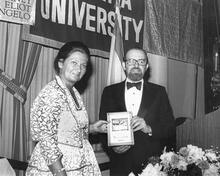Dominique Schnapper
Director of studies at the Ecole des Hautes Etudes en Sciences Sociales (School for Advanced Studies in the Social Sciences) in Paris, Dominique Schnapper was the driving force in the creation of a center for Jewish studies. In conjunction with her academic career, she has served on a number of major commissions. Since 2012, she has chaired the Museum of Art and History of Judaism. Several of her numerous books deal with the theme of nation and citizenship, the theme of nation and citizenship, and these themes in relation with the historical and sociological analysis of French Jews.
Family and Education
Dominique Schnapper was born in Paris on November 9, 1934, the daughter of sociologist Raymond Aron (1905–1983) and Suzanne Gauchon (1907–1997). Her father, one of France’s premier intellectuals, attacked President Charles DeGaulle for his statements characterizing the Jews as “self-confident and domineering” in his notorious press conference after Israel’s Six-Day War (1967). Despite the fact that her mother was Catholic and she received no Jewish education as a child, Dominique grew up with a very strong sense of Jewish identity.
In 1957, Schnapper received a degree in history and political science from the Institut d’Etudes Politiques (Institute of Political Science) in Paris. She holds a Ph.D. in sociology from the Sorbonne (1967) and a Doctorate-ès-lettres from the University of Paris V (1979). She served as Assistant Professor at the Institute of Political Science from 1972 to 1980, when she was appointed Director of Studies at the Ecole des Hautes Etudes en Sciences Sociales (School for Advanced Studies in the Social Sciences) in Paris, where she was the driving force in the creation of a center for Jewish studies.
In 1958 Dominique married Antoine Schnapper (b. 1933), a professor of art history. The couple have three children: Laure (b. 1960), Alain (b. 1963), and Pauline (b. 1968).
Sociological Work
Schnapper’s specialties cover numerous fields. Her works, which may be categorized as historical sociology, deal with the study of minorities, unemployment and labor, and, above all since the early 1990s, the nation and citizenship, all of which have been accompanied by constant epistemological inquiry. She first conducted a number of field studies on groups affected in one way or another by marginality: Italian immigrants, then Jews, and lastly the unemployed. In 1987, she participated in the Commission on Nationality set up by Marceau Long to study a possible reform of French nationality; subsequently, she conducted a broader investigation of the issues involving integration into the nation. Defining herself politically as a centrist, she has consistently defended the republican model and its universality as the ideal and virtual goal. Today the national model is being challenged from without by restrictions (in particular economic ones) on national sovereignty, and from within, by ideologies centered on the individual rather than on the citizen. However, according to Schnapper, the nation, in its republican and democratic definition, has up to now been the sole political framework capable of simultaneously taking on several functions: guaranteeing true equality and not only the formal equality of the individual, granting political rights to a steadily growing number of individuals, fulfilling the economic and social needs of all through the welfare state, and ensuring the recognition of cultural rights.
Schnapper’s work on French Jewry shows that its history from the time of the French Revolution until 1940 was one of assimilation into the French nation. Since then, however, Jewish awareness has taken on new forms, prompting her to suggest a three-category typology: 1) the observant Jews, who respect the specific forms of observance as defined by the metaphysics and ethics of Judaism; 2) the activists, who after contemporary historical events (in particular the Holocaust and the creation of the State of Israel) have shifted most of this ethic to the political arena; and 3) Israelites, who are neither observant or activists, yet nevertheless maintain a form of identity and sense of belonging. (Schnapper would consider herself as belonging to the third category.) In the 2000s, with fellow French sociologists of Judaism Chantal Borde-Benayoun and Freddy Raphaël, she studied the Jewish condition in Francedefining it between the two poles of loyalty towards the republican model and the claim for ethnic-religious specificities, alongside the double temptation of interventions in public life and withdrawal. In a 2018 book , Schnapper examined the democratic model through the example of the Jews, a minority group to be sure, but one that is emblematic: their passion for the Republic coexists with the persistance of specific loyalties, whether religious or not. Antisemitism is then interpreted as a challenge for the republican model ; according to Schnapper, the fate of the Jews, despite their minority status, sheds light on the construction of the modern nation and on the democratic project, and when the Jews are in danger, so is the Republic..
Professional Recognition
Dominique Schnapper has served on a number of official commissions: the Long Commission on Nationality, the 2000 Commission of the National Plan Supervisory Committee (1988–1989), the Review Commission (May 1993), the Commission on Drug Issues (1994), the Working Group on Military Service (1995), and the Education Commission (1995–1996). She was president of the French Sociology Society from 1995 to 1999. Among her numerous awards are The National Assembly Prize (1994) and the Balzan Prize (2002). An Officer of the Legion of Honor and Officer of the Arts and Letters, she was a member of the Constitutional Council from 2001 to 2010. She was vice-chair of the Governmental Mission of Studies in France on Research and Teaching on Genocides and Mass Murders, created in 2016. She is president of the Museum of Art and History of Judaism in Paris and president of the Institute of Advanced Studies in Paris since 2012. She was appointed president of the Committee of Sages on Secularism at the French Ministry of Education in January 2018.
Selected Works by Dominique Schnapper
Italy Red and Black: An Essay on Cultural Lifestyles in Bologne. Paris: Gallimard, 1971. (French)
The Sociology of Italy. Paris: Presses Universitaires de France, 1974. (French)
Jews and Israelites. Paris: Gallimard, 1980. (French)
The Test of Unemployment. Paris: Gallimard, 1981, 1994. (French)
France’s Integration: The Sociology of the Nation in 1990. Paris: 1991.
Immigrant Europe: An Essay on the Politics of Immigration. Paris: Editions F. Bourin, 1992. (French)
Community of Citizens: On the Modern Idea of a Nation. Paris: Gaillimard, 1994.(French)
Against the End of Work. A Conversation with Philippe Petit. Paris: Textuel, 1997. (French)
Relations with the “Other”: The Heart of Sociological Thought. Paris: Gallimard, 1998. (French)
Sociological Comprehension. Paris: Presses Universitaires de Frances, 2012. (French)
What is citizenship? Paris: Gallimard, 2000. (with Christian Bachelier)
Questioning Racism. Paris: Gallimard, 2000. (with Sylvain Allemand).
Providential Democracy: An Essay on Contemporary Equality. Paris: 2002; New York: Routledge, 2017.
Along the Way. Cronicles 1999-2001. Paris: Jacob, 2003. (French)
Diasporas and Nations, Paris: Odile Jacob, 2006. (with C. Bordes-Benayoun; French)
What is Integration?, Paris: 2007.
The Words of Diasporas. Toulouse: Presses Universitaires du Mirail-Toulouse, 2008 (with C. Bordes-Benayoun ; French).
Jewish Citizenship in France. The Temptation of Being Among One’s Own. Paris: Presses Universitaires de France, 2009 (with C. Bordes-Benayoun and F. Raphaël ; French).
A sociologist at the Constitutional Council. Paris: Gallimard, 2010. (French)
To Work and Love. Interviews with Sylvie Mesure and Giovanni Busino. Paris: Odile Jacob, 2013. (French)
The Democratic Spirit of Law., Paris: Gallimard, 2014. (French)
Democracy in France: Republic, Nation, Secularism. Paris: Odille Jacob, 2017. (with Perrine Simon-Nahum; French)
Citizenship Challenged. Democracy and the Jews. Paris: Gallimard, 2018. (French)




